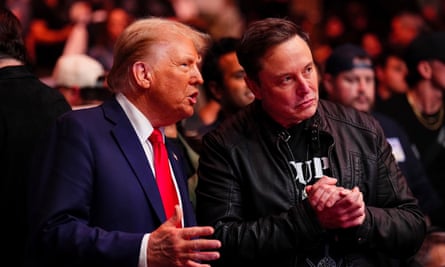Gambling on the outcome of the presidential election became legal in the US at the start of October after decades of prohibition, becoming a new type of pre-election poll. Online prediction markets such as Kalshi and Polymarket accepted billions of dollars in wagers on the outcome, with their users favoring Donald Trump with a 70% chance of beating Kamala Harris, out of sync with mainstream polls. Trump’s camp trumpeted the predictions.
In the UK, election gambling is legal and takes a very different form. Traditional bookmakers and betting firms take players’ wagers and set prices and odds. The bets are not as similar to prediction markets as they are to horse racing. These markets are prone to their own scandals. Kalshi and Polymarket offer an online vision of betting that encompasses a wider range of subjects, algorithmically sets prices and relies on cryptocurrency.
Now, Kalshi – riding the wave of those accurate predictions, millions of new users and billions of dollars in trades – is expanding the range of what its users can bet on. Polymarket is courting political influencers like Nate Silver and ZeroHedge to pose questions that users can bet on. Robinhood and DraftKings plan to throw their hats in the political betting ring, too. Will every public event soon be freighted with billions of dollars in online wagers? Will the Oscars become a new type of speculative financial market? Would you stake your life’s savings on whether egg prices will go up during Trump’s first month in office, a real bet you can make on Kalshi?
The Guardian’s Callum Jones reports:
“We’re just getting started,” said Kalshi CEO Tarek Mansour. Kalshi is adding “close to 100” new markets to its platform every day and plans to launch combination-based markets, allowing users to bet on a bundle of different outcomes, and conditional markets (for example, “if Trump wins, where will GDP be?”) within weeks. “I think that just accelerates from here …
Only “terrorism, assassination and violence” are off limits for Kalshi. What about Ukraine? While the conflict falls into the platform’s banned category, Russia’s invasion and the ensuing war have certainly moved stocks and commodities since February 2022. “We’ll see over time,” said Mansour.
That’s all great news for Kalshi. Polymarket is having a more muted post-election party. Last Wednesday, the FBI raided the Manhattan home of Shayne Coplan, the 26-year-old founder of the betting market, seizing his phone and other electronic devices. The company was quick to blame the 6am incursion on “obvious political retaliation by the outgoing administration”.
Bloomberg, however, reported that the US Department of Justice is investigating the company for allegedly accepting trades from US users, which it has been forbidden to do since a 2022 settlement agreement with regulators. The site’s users, however, have done their best to circumvent the geofencing with virtual private networks. Two weeks ago, Polymarket announced it would soon resume operations in the US. It is hard to imagine that restart going ahead with an active FBI investigation hanging over the company. Fortune also reported that “wash trading”, another illegal type of market manipulation, has allegedly proliferated on the site.
France is also grappling with the implications of Polymarket. A French man with the username Theo made the site’s most famous bet, an almost $30m (£23.7m) wager that Trump would win the US election. Do such massive bets constitute foreign election interference? Theo’s bet exhibits parallels to Polymarket itself, which is backed by US entrepreneur Peter Thiel, who made an early and unexpected wager on Trump in the 2016 election.
France’s gambling regulator is now probing the site for any market manipulation, and cryptocurrency trade publications have reported that the country is considering banning it. In response, Polymarket stated it has seen no evidence of market manipulation.
Can Trump and Elon Musk weaponize the US internet and satellite regulator?
 View image in fullscreen
View image in fullscreen
Late Sunday, Trump announced he would nominate Brendan Carr as head of the US Federal Communications Commission (FCC). The conservative commissioner wrote a chapter on the furture of the FCC for Project 2025 (the infamous hard-right playbook for the second Trump administration), the only sitting government official to do so. Carr’s views on the US tech sector have mostly aligned with those of Trump and Musk. In recent months, they have all lambasted broadcast TV networks and public broadcasters.
Carr has advocated for going after Meta and Google, not to hem in monopolistic practices but to dismantle the “censorship cartel” of big tech companies that he believes are stifling conservative speech. Google, already reeling from the loss in its antitrust case against the US, may be a big loser in the incoming administration, as Trump has railed against it in campaign speeches. Carr has also supported banning TikTok over alleged national security threats.
Carr’s agency could be a political cudgel for Trump in his personal retribution against tech companies. The commissioner is a friend of the telecommunications industry and an enemy of Silicon Valley’s tech giants. Will he apply a hands-off approach to internet service providers, dismantling consumer protections in a boon to the industry’s large incumbents, and then apply scrutiny and harsh authority to the likes of Google and Facebook, sacrificing consistency in favor of political expediency?
“Brendan Carr has been campaigning for this job with promises to do the bidding of Donald Trump and Elon Musk,” said Craig Aaron, co-CEO of Free Press Action, a left-leaning media advocacy organization. “Carr doesn’t care about protecting the public interest; he got this job because he will carry out Trump and Musk’s personal vendettas.”
Carr could also turn the FCC into a commercial bludgeon for the “First Buddy”, as Musk has christened himself, against the billionaire’s tech rivals. A major beneficiary of the commissioner’s ascendance is likely to be Musk’s SpaceX, whose satellites and the internet service they provide are under the FCC’s purview. In his Project 2025 proposals for the FCC, Carr emphasizes his priority to “advance America’s space leadership”. He namechecks Starlink (SpaceX’s satellite internet firm) and says his agency will adopt as friendly a regulatory stance towards the company’s launch schedule as possible.
skip past newsletter promotionSign up to TechScape
A weekly dive in to how technology is shaping our lives
after newsletter promotion
Lock up your phones
 View image in fullscreen
View image in fullscreen
When everyone is digging for gold, sell shovels. That’s what a company called Yondr has found. As schools across the globe are implementing phone-free days and governments are discussing whether children should be banned from social media entirely, this brand has found a market opportunity. Founded in 2013, Yondr was one of the first companies to manufacture lockable phone pouches in which students (and others) can quarantine their devices. One million students use a Yondr pouch daily across 35 countries, CEO Graham Dugoni told the Guardian.
Dugoni said that when a principal, school district or state implements a phone-free policy, his company sees a spike in business. He was hesitant, however, to use the word “ban” when referring to schools’ policies towards phone usage. “No one’s doing anything wrong. And we’re not anti-tech as a company … It’s more how do we live with these tools in the future in a constructive way.”
Dugoni wants people to live in harmony with smartphones rather than prohibiting them, though he uses a flip phone and doesn’t maintain any social media profiles for himself or his company. “Creating a phone-free space is a positive move forward. It’s not trying to take something away or pull back into a world in the past. It’s how we create a framework and societal etiquette around something that’s radically new and everyone’s trying to appreciate the internet’s potential and possibilities.”
The wider TechScape
 View image in fullscreen
View image in fullscreen
Why are wildlife biologists are chasing after bears with drones in the American west?
“First buddy” Elon Musk and failed presidential candidate Vivek Ramaswamy were formally appointed as heads of Doge, or the Department of Government Efficiency, to carry out slash-and-burn cuts. And Musk wants volunteer “high-IQ revolutionaries” to help them.
The Wall Street Journal has the inside story (£) on how the tech industry, particularly Meta and Alphabet, has lobbied against the US Kids Online Safety Act.
The Guardian will no longer post on X from its official accounts.
And why are so many people leaving X for Bluesky? Tom Ambrose profiles the heavily moderated platform.
Trump’s incoming administration is planning to loosen restrictions on self-driving cars, a priority for Musk, Bloomberg reports.
Bitcoin and Dogecoin are going hog wild in the wake of Trump’s victory.
Mark Zuckerberg and T-Pain have released a cover of the rap song Get Low.
